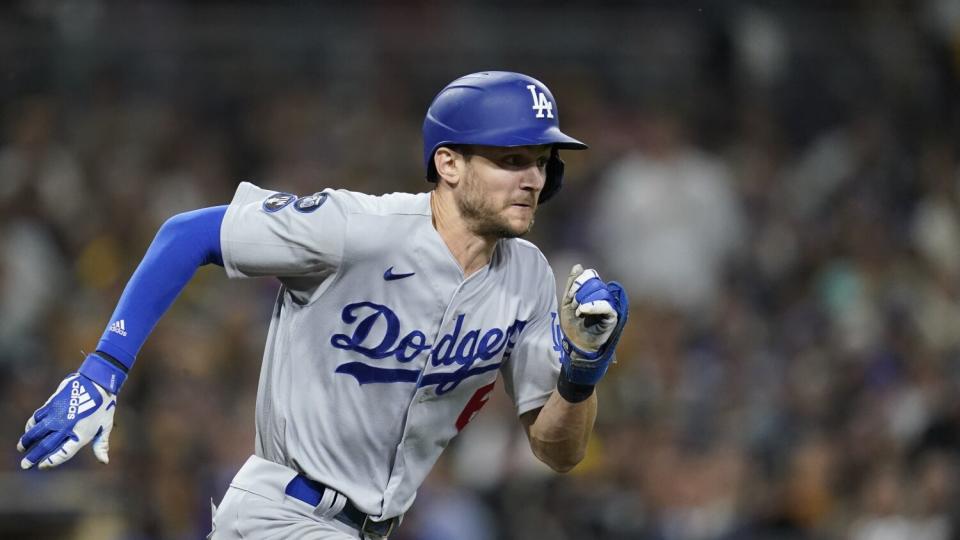Rob Manfred: Angels would like sale completed by opening day

In August, Angels owner Arte Moreno put his team up for sale. The bidding has not started yet, and that process is expected to begin no sooner than January.
When the 2023 season starts, will Moreno still be the owner?
“My understanding is that the club would like to have the sale resolved before opening day,” Commissioner Rob Manfred said Tuesday. "Whether that happens, I think, depends in part on the bidding process and how quickly you can get documents done.”
Major League Baseball is processing potential bidders, because a background check is required to get approval to see the financial information necessary for a party to determine how much its opening bid might be. Manfred said “multiple parties” have cleared that step.
In the meantime, Moreno has approved spending toward what could be the first $200-million payroll in team history. The Angels have committed about $72 million to pitchers Tyler Anderson and Carlos Estévez, infielder Gio Urshela and outfielder Hunter Renfroe this winter, with the shortstop position still targeted for an upgrade.
On other topics, from Manfred’s news conference at the winter meetings:
— Baseball is making headlines in December. On Monday, Trea Turner got $300 million from the Philadelphia Phillies, with multiple reports that the San Diego Padres offered him $342 million. Any day now, Aaron Judge could sign for even more millions. And the vaults are open for lesser players too, as evidenced by those Angels signings.

Attracting that attention is good, Manfred said, but not all good.
“On the positive side, I think a week in December where there is a ton of focus on players and where they are going to be is a good thing, in terms of marketing the game,” he said.
“On the down side … we have a level of revenue disparity in this sport that makes it impossible for some of our markets to compete at some of the numbers we’ve seen. That’s not a positive. It’s like everything else in life: There is good and bad.”
— The biggest challenge for the league — and for every American sports league — is the collapse of cable and satellite television. Those mega-contracts have been funded by deals in which a regional sports network (RSN) pays a team handsomely for the right to broadcast its games, providing the team with money to lavish upon players.
But cable and satellite providers pitch “bundles,” in which viewers pay for plenty of channels they never watch. If streaming turns viewing into an a la carte experience, leagues and teams could be faced with a decline in broadcast revenue. The operator of Bally Sports West — the Angels’ RSN — this week all but divorced itself from its parent company, amid industry concerns that the Bally group of stations could file for bankruptcy if a solution is not found soon.
“The RSN model as it exists today is probably not sustainable over the long haul,” Manfred said, “as a result of the number of people that are opting out of the cable bundle.”
Because fans still want to watch games, Manfred said he sees “opportunity” in “trying to come up with a new model that is more sustainable and, most important from our perspective, gives us better reach in terms of fans being able to get games, whether they’re in the bundle or out of the bundle.”
— Manfred news conferences in recent years regularly include a reference to Oakland running out of time to strike a deal for a new ballpark for the Athletics, and this one was no different.
“We’re past any reasonable timeline for the situation in Oakland to be resolved,” he said Tuesday.
The A’s and the city have yet to agree on a plan, in part because the A’s have asked the city to handle hundreds of millions of dollars in infrastructure costs and in part because the A’s have yet to agree with the city about the amount of affordable housing to be included in what the team is pitching as a $12-billion neighborhood revival.
The A’s have agreed to line up private financing for the project, including $1 billion for a waterfront ballpark. They have explored options for moving to Las Vegas but have yet to reach a deal either there or in Oakland, and Manfred declined to say whether A’s owner John Fisher could reach agreement in Oakland by putting more of his team’s money into the deal.
“An owner who is prepared to invest a billion dollars in building a stadium is [making] an unbelievable commitment on the part of ownership,” Manfred said.
— On Tuesday morning, a truck drove past the hotel hosting the meetings, with an electronic billboard displaying a demand that the league apologize for moving the 2021 All-Star Game out of Atlanta and depriving the region of $100 million in economic impact. That oft-repeated figure is entirely mythical.
Manfred moved the game after Georgia adopted laws that voting rights advocates said made it more difficult for people — and in particular minorities — to vote. Opponents have cited robust Georgia vote totals since then in saying Manfred committed an error.
“I think that we have really focused,” Manfred said, “on the idea that we need to make decisions that are as inclusive and welcoming to everyone as possible, keep us as apolitical as possible and put us in a position to do whatever it is we’re looking to do in any one of our 30 markets.”
This story originally appeared in Los Angeles Times.

